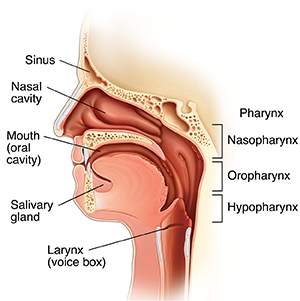Head and Neck Cancer: Introduction
What is cancer?
Cancer is when cells in the body change and grow out of control. To help you understand what happens when you have cancer, let's look at how your body works normally. Your body is made up of tiny building blocks called cells. Normal cells grow when your body needs them and die when your body doesn't need them any longer.
Cancer is made up of abnormal cells that grow even though your body doesn't need them. In most cancers, the abnormal cells grow to form a lump or mass called a tumor. If cancer cells are in the body long enough, they can grow into (invade) nearby tissues and organs. They can even spread to other parts of the body (metastasis).
What is head and neck cancer?
Head and neck cancer is the term used for cancers that start in the head and neck region. There are many different types of tissues in this area. These cancers can start in any of these places:
-
Voice box, or larynx
-
Nasal cavity, the passage behind the nose that air passes through on its way to the throat during breathing
-
Mouth or oral cavity, including your lips, gums, tongue, and tonsils
-
Paranasal sinuses, the spaces around the nose that are lined with cells that make mucus, which keeps the nose from drying out. They're also the space that allows your voice to echo when you talk or sing.
-
Throat or pharynx
-
Salivary glands, the glands that make saliva, which keeps food moist and helps dissolve food

Types of head and neck cancer
There are many types of head and neck cancer. Here's an overview of the common types and the part of the body they affect:
-
Cancer of the hypopharynx starts in the tissues in the bottom part of the throat, behind and beside the voice box.
-
Cancer of the larynx starts in the voice box, which is in the neck, at the top of the main breathing tube called the windpipe, or trachea.
-
Cancer of the nasopharynx is found in the tissues of the upper part of the throat, behind the nose.
-
Cancer of the oral cavitystarts in the mouth or tongue.
-
Cancer of the oropharynx is in the back of the mouth or the middle part of the throat.
-
Cancer of the paranasal sinus and nasal cavity starts in the tissues in the small hollow spaces around the nose, known as the paranasal sinus and nasal cavity. The nasal cavity is just behind the nose.
-
Cancer of the salivary gland is in the salivary glands. These glands are just below the tongue, on the sides of the face in front of the ears and under the jawbone. There are also salivary glands in different parts of the upper digestive tract.
Talk with your healthcare provider
If you have questions about head and neck cancer, talk with your healthcare provider. Your healthcare provider can help you understand more about this cancer, the exact type you have, and its location.
Online Medical Reviewer:
Jessica Gotwals RN BSN MPH
Online Medical Reviewer:
Raymond Turley Jr PA-C
Online Medical Reviewer:
Todd Gersten MD
Date Last Reviewed:
5/1/2023
© 2025 The StayWell Company, LLC. All rights reserved. This information is not intended as a substitute for professional medical care. Always follow your healthcare provider's instructions.